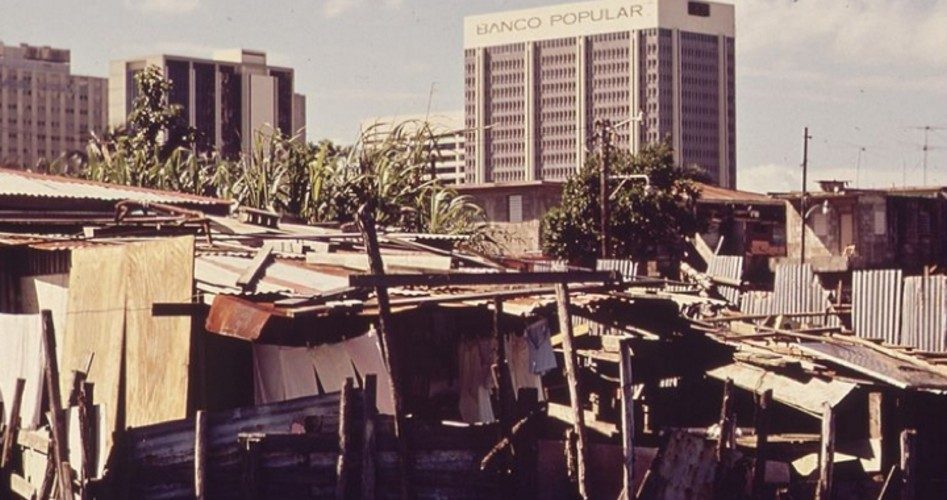
Puerto Rico continued its “death spiral,” with its failure to make a $422 million interest payment today on some of the island’s gigantic $73 billion debt. This comes on the heels of missed payments over the last year, and will be followed up by a $2 billion payment due on July 1, which it is also widely anticipated to miss. The payment is due from the island’s Government Development Bank (GDB), the main bond issuer and the island’s fiscal agent.
So far Governor Alejandro Garcia Padilla has, as noted previously in The New American, been able to keep the lights on and the water running by moving money around on the island’s balance sheet, paying only those with the highest and most enforceable claims and dealing as best he can with those holding lower credits. It was Padilla who said his island was in a “death spiral” as far back as last July, because his 3.5 million inhabitants, half of whom live in poverty, didn’t have the money.
But for decades Padilla and his predecessors acted as if they did have it, spending borrowed money on infrastructure, government facilities, overly generous welfare and retirement benefits and giving away free electricity, offering tax incentives to pharmaceutical companies and other manufacturing companies, and, best of all, granting triple-tax exemption on bonds issued by its numerous government agencies to keep the funds flowing.
Things started to unravel in 2006 when those pharmaceutical tax breaks ended and 80,000 workers were laid off as those companies moved away. The Great Recession hit shortly afterward, with resultant declines in tourism and economic activity. The continued enforcement of the Jones Act, a relic of the 1920s (requiring that all goods imported by the island’s economy be carried on U.S.-flagged ships that were built in the United States and owned by U.S. citizens) has kept import costs painfully and unnecessarily high.
But the real issue is Padilla’s inability to declare bankruptcy under Chapter 9, as the only way out of the mess, according to Steven Rhodes, the retired federal judge who oversaw Detroit’s bankruptcy and was hired by Padilla: “There are way too many creditors and way too many kinds of debt. [Puerto Rico] needs a Chapter 9 for the whole commonwealth.”
House Speaker Paul Ryan put this near the top of his priority list in January, hoping that the House would have something to tell Padilla long before now. But in typical government fashion, rather than granting Padilla the power to declare bankruptcy, the House instead is considering a bill offered by Representative Rob Bishop (R-Utah) to get intimately involved in the island’s finances. The bill would set up a federal fiscal oversight board in order to facilitate the bankruptcy. But Bishop isn’t calling it a bailout, just a bill that would, according to him, “give Puerto Rico access to a court-enforced debt restructuring in exchange for the imposition of a federal fiscal oversight board.”
It’s no wonder, in this election year, that Bishop’s bill has little traction. More government interference is the last thing voters want to hear from Washington. The next time the House Natural Resources Committee meets to consider Bishop’s bill is May 10, but that is of little help to Padilla, who stated:
We can’t wait longer. We need this restructuring mechanism now. We do not want and we haven’t been offered a bailout. A restructuring process will cost nothing to American taxpayers. We simply want the legal tools needed to address our insolvency crisis and ensure the sustainability of Puerto Rico.
As Padilla continues to struggle, the hapless citizens of the 3,500-square-mile island are going to continue to take a pounding. By allowing credit unions to buy debt of the Government Development Bank, losses on that debt will be spread among the million or so residents who have their savings in their local credit unions. As Padilla continues to rob Peter to pay Paul, those same citizens will see their infrastructure continue to deteriorate and will be lucky indeed if they are able to keep their lights on and the water and sewer systems operating.
Unemployment, already well into double digits, will continue to rise. The island’s tiny economy will continue to shrink, and its “brain drain” will escalate as those who are able to leave the the island will continue doing so, at the rate of two planeloads every day. Today there are more Puerto Ricans living in the United States (mostly in Florida) than on the island itself.
The impact on the enormous $3.7 trillion municipal bond market could spread the pain far beyond Puerto Rico. Hedge funds have bought huge quantities of the debt, investors seeking yield and tax-favored treatment have hoovered up the island’s bond offerings until the three main credit rating agencies reduced its bond offerings to junk status in late 2014.
At home Padilla has already transferred monies from the workers’ compensation pool and public pension systems just to pay the country’s bills. He has taken cash from low-priority bonds to make the payments due on high-priority bonds. And he has sold future highway toll revenue in exchange for $115 million to help his cash flow.
Until there is a solution, whether imposed by regulators, the U.S. Congress, bond holders, or investors, the citizens will bear the brunt of the overspending of days gone by. It’s the taxpayers — always the taxpayers — who end up paying for the politicians’ largesse, funded by investors seeking tax exemption and aided by Wall Street and credit rating agencies looking the other way.
Many see Puerto Rico as a microcosm of the United States just a few short years from now when it, too, finally is no longer able to manipulate its finances to pay for its promised payments.
A graduate of an Ivy League school and a former investment advisor, Bob is a regular contributor to The New American magazine and blogs frequently at LightFromTheRight.com, primarily on economics and politics. He can be reached at [email protected].
Related articles:
Puerto Rican Senate to Investigate Causes of the Island’s Financial Woes



